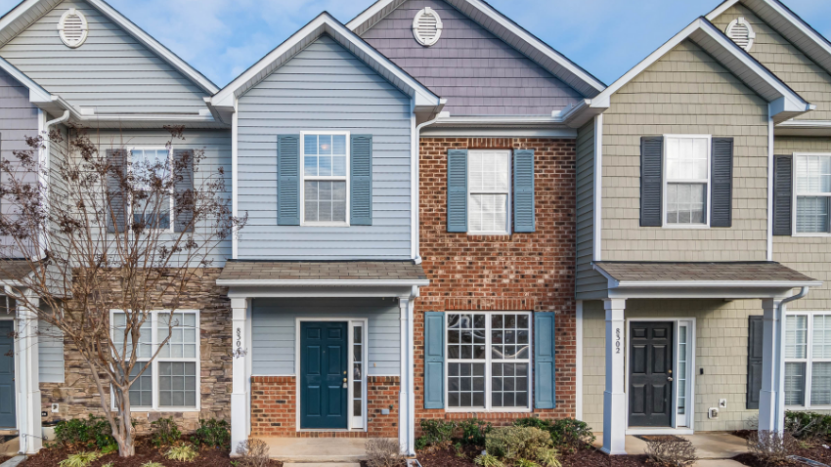Understanding the DSCR Loan
The Debt Service Coverage Ratio (DSCR) loan allows you to acquire or refinance an investment property based on its rental revenue, and not on your personal earnings.
These loans broaden the horizons for investors, as they circumvent the income documentation requirements (W2s and tax returns) imposed by traditional types of financing.
Full-time investors might not have a standard income, or they might be unable to document enough income on personal tax returns to meet the eligibility criteria for a traditional rental property mortgage.
The DSCR loan, also known as the investor cash flow mortgage scheme, eliminates this obstacle, granting a loan based on the promising cash flow potential of the property.
What this article covers?
- Who’s eligible for a DSCR loan
- 5 pieces of advice for real estate investors
- How to get started with your DSCR loan
- And Frequently Asked Questions
Explaining DSCR loans
Every rental property possesses a debt service coverage ratio. DSCR is a simple juxtaposition between revenue and payments. It informs the lender whether the property’s monthly income “covers” the cost of debt service, more commonly recognized for purposes of these loans as the total housing or property payment.
Consider a rental property generating $2,000 in monthly income with a total housing payment of $1,500. This property has good cash flow.
So why do traditional lenders insist that the buyer qualifies with their personal income? The property can pay for itself, with some left over. Why not introduce a mortgage that doesn’t require tax returns?
DSCR loans utilize this situation to allow the property to qualify independently.
DSCR is calculated as Gross Rental Income / Total Housing Payment (principal, interest, property taxes, insurance, and HOA dues, if any – or PITIA). In the above scenario, the DSCR is 1.33 ($2,000 / $1,500), which is quite strong for a residential DSCR loan. Every DSCR lender would approve a loan for this property even without verifying the buyer’s personal income, as long as the borrower has a sufficient down payment (or equity for refinance) and credit score.
Calculating DSCR
Many DSCR lenders prefer a DSCR of 1.0 or higher. A DSCR of 1.0 simply signifies that the property’s rent exceeds the total housing payment or PITIA. There are, however, many lenders that will also accept DSCRs under 1.0 down to 0.75. And there is another tranche of lenders that will accept even lower DSCRs. The lower the DSCR though, the higher the down payment and credit score requirements.
DSCR = Gross Rent / Housing Payment
When evaluating a deal, input the figures to see what kind of DSCR loan you can qualify for. If your DSCR is 1.0 or higher, you could qualify for the best possible terms with a down payment of as little as 20%.
Lenders calculate residential and commercial properties differently. Properties with 1-4 units are usually classified as residential, while those with 5 or more units are considered commercial.
For residential DSCR income calculations, it’s straightforward. The rental income is the actual rent if the unit is occupied or the estimated market rent if the unit is vacant. If the unit is vacant, an appraiser needs to estimate the market rent using a Fannie Mae form 1025 or a Freddie Mac form 72.
What is the lowest DSCR to qualify?
Believe it or not, some lenders will accept a DSCR well under 0.5 all the way down to almost zero. These are known as “no ratio” loans and they come with much higher down payment and interest rate requirements than other types of DSCR loans. The DSCR loans with the best terms have DSCR requirements of 1.0 or higher. These loans require as little as 20% down and have interest rates that are about 1% higher than what an investor might get with a Fannie Mae loan that requires traditional income documentation. There is another tranche of DSCR loans for scores in the 0.75 to 0.99 range. These loans typically require a down payment of at least 25%, or an equity cushion of at least 25% if a borrower is looking to just refinance.
Eligibility for a DSCR Loans
In numerous ways, qualifying for a DSCR loan is simpler than for a traditional loan. Guidelines vary among lenders, but here are the typical DSCR loan requirements.
Loan-to-value (LTV)
Most DSCR loan lenders require 20-25% down, meaning a maximum LTV of 75-80%. If a DSCR is under 0.75, however, or if a borrower’s credit score is relatively low, even larger down payments will be required.
Credit Score
The minimums vary tremendously among lenders, with some allowing scores as low as 620. Some lenders may also accept a past foreclosure or bankruptcy, provided it’s over three years old. But, keep in mind, lower scores usually mean higher rates and larger down payments.
Loan Purpose
DSCR loans are available to finance purchases, rate-and-term refinances, or cash-out refinances.
Property Type
Non-traditional properties like non-warrantable condos, 5+ unit, commercial, and more are sometimes accepted. More traditional properties such as single-family homes, duplexes, and 3-4 unit properties are also permitted.
Property Use
The loan must be for an investment/rental property. Long and short-term rentals (Airbnb, Vrbo) are also allowed depending on the lender.
Loan Type
DSCR lenders offer fixed-rate loans, adjustable-rate mortgages, and interest-only loans.
Income and Employment, Debt-to-Income Ratio
The buyer’s income and employment are usually not verified. Because the borrower’s income is not verified, there is no debt-to-income ratio requirement.
Maximum Loan Amount
Loan amounts can reach into the millions depending on the lender.
Maximum Properties Owned
Most DSCR lenders do not impose a limit on the number of properties the borrower owns.
Prepayment Penalties
Verify with the lender before applying, as some DSCR loans include prepayment penalties, which could cost you thousands of dollars if you pay off, sell, or refinance within a set period of time (anywhere from one to three years).
Closing in the Name of an LLC
Unlike with traditional residential loans, most DSCR loans allow you to register the title in the name of an LLC at closing.
Seller Paid Closing Costs
Some lenders permit you to receive credits from the seller to help cover closing costs. In competitive markets, however, sellers are often reluctant to grant such credits.
DSCR Mortgage Rates
DSCR loan mortgage rates are typically range from 1% to 3% higher than conventional mortgage rates – depending on the actual DSCR, credit scores and down payment or equity amounts.
You should anticipate higher rates since investment property loans are generally more expensive in general. Lenders perceive non-owner-occupied loans as riskier and require higher rates as compensation, and DSCR loans are no different.
View mortgage rates for
April 27, 2024
Alternatives to DSCR Loans
Here are a few alternatives to DSCR Loans for borrowers who cannot provide traditional income documentation.
Asset-based loans. Borrowers with abundant liquid assets can qualify for mortgages without verifying their income. Some asset-based loans impute income from the overall assets, while others simply ensure there are enough assets to cover the entire mortgage.
Bank statement loans. For those who earn significant incomes but have difficulty with formal income verifications, there are bank statement loans. Bank statement loans typically just add up all of your deposits on your last twelve or twenty four bank statements and then divide that total by the number of bank statements used. That average will be the income to be used in lieu of paystubs, W2s, and/or tax returns.
Hard money loans. These are loans that focus almost exclusively on the property and little else – requiring almost no documentation other than an appraisal. They, however, require large down payments and much higher interest rates and fees.
Pros and Cons of DSCR Loans
Pros
-
No need to verify personal income or employment
-
Investor-friendly terms
-
Potential for higher loan amounts versus traditional loans
-
Applicable for long- and short-term rentals, commercial properties, and more
Cons
- 20-25% down payment required (or more if credit scores or DSCRs are low)
- Primary residences are not allowed
- Interest rates and fees are higher than those associated with more traditional loans.
5 Suggestions for Real Estate Investors
1. Prioritize properties with positive cash flow
While properties with a positive cash flow are not required by many DSCR lenders, they are obviously recommended for many reasons. Famous real estate investor Ken McElroy advises investors to always buy investment properties with a positive cash flow. This ensures you will be able to make your housing payment every month – no matter what happens with your employment situation, and it will allow you to build additional cash reserves for future investments. Mr. McElroy advises against buying a property just for its appreciation potential – without worrying about cash flow.
2. Conduct comprehensive checks on potential tenants
Whether they are residential or business tenants, it’s crucial to do an exhaustive background check on anyone who will occupy your property. Factors such as low credit ratings, a history of evictions, insufficient income to afford the rent, or a negative impression can deter you from renting to a particular tenant. Even though there will always be prospective tenants, a troublesome tenant can prove expensive in terms of both time and money.
3. Engage expert legal and accounting assistance
As an investor, you are not expected to be an attorney or a certified public accountant. Attempting to wear all hats can compromise essential elements of your venture. It’s a worthwhile investment to pay for the services of professionals who have dedicated years to acquiring their expertise and experience, which will eventually save you money.
4. Contemplate professional property management
While some property owners find self-management of their properties rewarding, and indeed it can be cost-effective, the multitude of management aspects such as upkeep, legal compliance, and rent collection might encourage others to delegate these tasks to professionals. This is particularly the case if an investor owns properties out of state.
5. Concentrate on a specific geographic location
Most investors concentrate their efforts within one or two geographic regions. There are a couple of key reasons for this. Firstly, it enables you to familiarize yourself in-depth with the local market. How would you know if a 3-bedroom, 2-bathroom house in a specific neighborhood is priced reasonably without having explored hundreds of comparable properties in the area? Secondly, you can establish relationships with local agents, plumbers, electricians, etc., and use their services across your properties, thus avoiding the hassle of sourcing new service providers for each property.
DSCR Loans FAQ
Where do DSCR loans prove most beneficial?
DSCR loans work in all regions, but they be more beneficial in relatively hot markets where properties and rents are appreciating faster. Rising rents will make it easier to cover the mortgage payment associated with a slightly higher cost DSCR loan.
Are DSCR loans beneficial?
DSCR loans can indeed be very advantageous, particularly for full-time investors without traditional W2 income or those with significant deductions on their tax returns. These loans get approved based on the property’s income, not the borrower’s, and they offer numerous other advantages that facilitate swift expansion of your real estate portfolio.
Can DSCR loans be utilized for a primary residence?
Not commonly. Since primary residences don’t produce income, there would be no income to validate. Some lenders might consider a multi-unit property where you inhabit one unit, provided the property still boasts a sufficient debt service coverage ratio. Consulting with lenders on this subject would be an essential step.
Are DSCR loans no-income-verification loans?
Yes, these loans are categorized as “non-QM” or “non-qualified mortgages,” meaning they are not bound by the regulations governing traditional and government loans. They do not necessitate income verification like more traditional “qualified” mortgages.
Is it possible for anyone to obtain a DSCR loan?
Qualification for a DSCR loan is possible if the property in generates rental income – but borrowers need to be prepared to come in with large down payments if the property has a DSCR under 1.0. Income or employment verification is typically not required for most DSCR loans, but a credit score of approximately 640 or higher is a must, along with no recent instances of foreclosure or bankruptcy.
Is a down payment required for a DSCR loan?
Yes, a down payment of 20-25% is required for most DSCR loans. And even larger down payments are required if credit scores or DSCRs are low.
Is a DSCR loan classified as a commercial loan?
DSCR loans can be applied to both residential and commercial properties, although some lenders might exclusively offer them for only one or the other.
Can a DSCR loan be used for home purchase?
A DSCR loan can be used to acquire an investment property, but it’s generally not feasible to use it to buy a primary residence, given that a personal dwelling doesn’t typically generate income. Regulations also make it very difficult for DSCR lenders to finance a primary home purchase.
Get Started With A DSCR Loan Today
DSCR loans provide a pathway to opportunity for the right kind of buyer. Investors in short-term and long-term rentals, and other income-generating properties, can bolster their portfolios far quicker than with traditional loans.
























